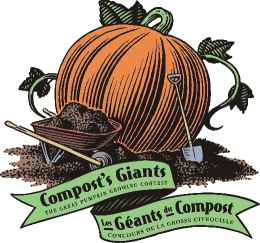


Composting is a process of controlled decay. Microbes break down organic materials into their constituent elements, which they use to make their own products (the stuff we call humus). Plastics may have come from organic materials originally (because petroleum was formed from dead plants and animals), but it has been processed way too much for the microbes in the composting pile to handle. Glass and metal are not organic, so they, like the plastics, pass through the process unchanged.
Why is this a problem? Well, as a gardener, would you like your garden to become a smaller version of the local landfill, filled with bits of metal, glass and plastic? No? Well, neither do farmers or golf course managers or anyone else who uses compost to build better soils. Physical contaminants such as these are not generally a problem with respect to pollution, since they don’t break down easily but they are a problem for the people at the compost facility, who are trying to market the compost to the highest possible end user.
Contaminated compost usually ends up as daily cover on landfills, which kind of defeats the purpose, don’t you think? So please, keep the metals, glass, and plastics out of your organic waste bin |you’re your backyard composter). The environment will benefit, which means we all benefit.



